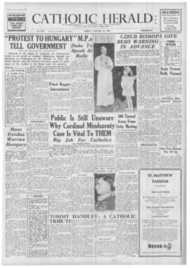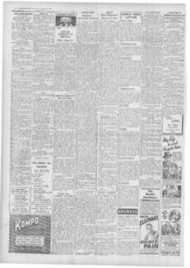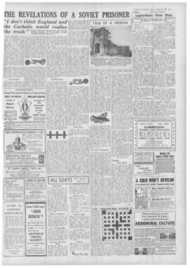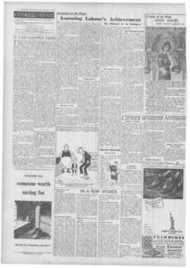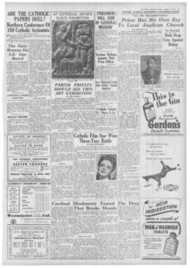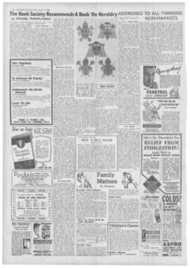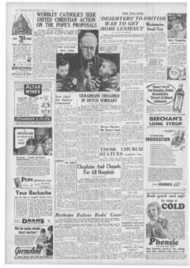Page 3, 21st January 1949
Page 3
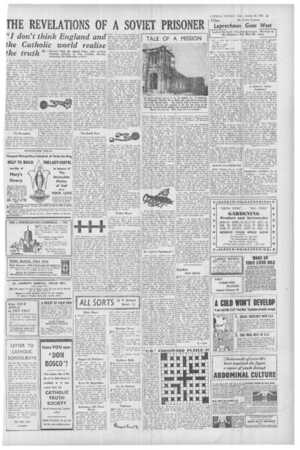
Report an error
Noticed an error on this page?If you've noticed an error in this article please click here to report it.
Tags
Share
Related articles
No Collaboration
Conversion Of England From Discussion To Action
Letters To The Editor Our Correspondents Are Urged To Limit
Spain's Present Attitude Does It Contain A Lesson For Us ?
Tea A Letter.
THE REV LATIONS OF A SOVIET PRISONER
I don't think England and the Catholic world realise the truth
Ay -Extract from the signed letter, with verified German address, to The Catholic Herald, enclosing the following article :
I is an indescribable feeling, ' when on the way from imprionment in Soviet Russia, one .eaches the Friedland Transit :amp and, crossing the frontier here from the East to the Nest Zones, is immediately :onfronted by the friendly and fee/sling face of a Catholic sliest, who welcomes the home:tomer in the name of his ;hristian land. For the first time in iv e years a Catholic blessing, and he same evening the first Catholic ervice 1 Only now does one really selieve that one has escaped from he weird East and need no longer 'ear the malicious caprice of the
Russians. All the frightful horror af the past five years sinks behind one like a confused dream, and one begins to breathe freely. remembering that one is once more a free man.
The road of suffering through the Bolshevik hell started on being taken prisoner in the middle sector of the Eastern front. At the same time one was still in doubt whether, in view of the very general " liquidation " of officer prisoners, by shooting in the back, one would have the luck to be left with one's life.
The Reception
After numerous examinations of both a military and political character carried out by Soviet front line officers of correct behaviour. one found oneself, a wounded prisoner of war, in the territory held by the Red Army. Here began the reign of unrestrained caprice and cynical brutality. The most horrible scenes used to take place on the roads. Without any reason officers and their men were fetched out from the columns of prisoners by members of the Red Army or by partisans and massacred by the roadside. Russians driving past played at shooting with machine guns from their cars at the prisoners as they staggered hy. Tanks and heavy lorries drove recklessly at undiminished speed right through the marching columns. The greater number of wounded. already in an extremely weak state, did not sur vive the excessive hardship of the four or five days' march without any sort of care. The survivors were sent to the hospital for prisoners of war at Kursk. Here dysentry raged, but the regime of terror carried out by the German hospital Commandant, who had been bought by the Bolsheviks with gifts of special food, was something still more terrible. With a cudgel or a dog whip he would lash out unmercifully at the seriously ill or dying. who were no longer able to control their physical
functions. Anyone who has seen the eyes dilated with terror and madness, the terribly distorted faces of
these miserable skeletons-anyone who has heard the howls and moans of these men become abject, under the heel of the beast-men who in their exhaustion and helplessness, even crawling on all fours, could not escape the frightful blows-can never in all his life forget those hours of horror.
After repeated visits from Soviet Medical Comniissions the hospital Was closed at the end of 1944. and the patients were evacuated to the other side of the Urals. During the railway journey, which lasted weeks. in unheated goods trains. the sick and wounded were robbed of their warm German uniforms and foot' wear by their Soviet escorts at the point of the gun, and in their place were thrown indescribable rags. filthy and verminous. The hardships of this transfer, carried out in .exceptionally cold weather, tooe toll of one-fourth of the sick and wounded in the course of three weeks. so that at Aktjubinsk, in North Kasachstan, the train had to be emptied of the corpses. In the summer of 1944, the prisoners-ofwar in the hospital at Martuk, in Aktjubinsk, who had become fit to be moved, were transferred to Camp 7099 (Karaganda).
The Death Rate
The principal camp (Camp Sector 1) of the 20 camp divisions was, in the spring of 1948, on the lands of the former British concession, Spasski-Ssawod, an unused copper foundry 45 km. (28 miles) south-east of the town, in the middle of the Steppes. The completely insufficient food, the unhealthy lodging, the lack of protection against the effects of the unaccustomed climate (up to 50 deg: centigrade in summer and as low as 50 deg. C. below zero in winter) and the insufficient medical care, led to a frightful number of deaths in the years 1944, 1945 and 1946 in the Soviet prisonerof-war camps. In the SpasskiSsawod camp alone the average death-rate during this period was 3435 men per day, out of a camp population of 1,500-2,000, as the author had the opportunity of ascertaining from the nightly rollcall held by the Camp Command
ant. Besides, the very extensive burial field at the camp, with its graves of over 10,000 prisoners-ofwar, proves the unusually high death-rate. The graves, which specially in winter, are rooted up by hyenas and Steppe wolves and robbed of the bodies, have been left without any marks, and to-day are very much levelled out. But the Steppe is silent. Conditions in most other Soviet-Russian prisonerof-war camps were similar to those in Spasski-Ssawod (Karaganda).
This intentional or unintentional extermination of German prisonersof-war in the Soviet Union during the years 1942-1946 is the only explanation for the enormous discrepancy between the number of Germans really taken prisoner by the Russians (over 3-t million), and the number officially given by the Soviet Government in the spring of
1947 (1.89 million). Because the Soviet Union had every reason to fear a checking of the occurrences in the Soviet prisoners-of-war camps. they have done everything to obliterate all traces of the wholesale mortality. Formerly no notification was given through the Soviet Red Cross to the relatives of German prisoners-of-war, internees or those taken away by force, who died, and even up to the present time such notification is deliberately withheld. Notification to the relatives of deceased men through comrades is strictly forbidden, and is prevented by means of a severe censorship of
letters. In the camp hospitals any registers of deaths kept by the German doctors or hospital officers for those years were called in and destroyed. Even those prisoners coming home now are carefully searched and any hit of paper with addresses or notes is confiscated.
With the ntass of prisoners-ofwar who still survived, the Soviet Union aimed at two things: (1) The pitiless exploitation of these millions of mostly highly skilled workers, for the better economic development of the Soviet Union, and the building up of National Defence; (2). the political re-education On Communistic lines for the East Zone, and as underground shock troops for tht West Zones of Germany.
The first aim was attained by placing the prisoners in industry and agriculture, priests, university professors, university graduates. and others of intellectual calling being sent down to the coal and lead mines, as if they were trained miners, while Communists and police spies of the NKWD (Cornmisariat for the Interior: to-day, Ministry of the interior, formerly Cheka or OGPU) occupied administrative posts in the camp. Up to the present day the principle is consistently adhered to, that only those are sent home who through an accident at work, illness or physical exhaustion would be incapable of working as forced labourers during the next six months, or who, having completed their Communistic training are sent to Germany under special orders from the NKWD or the Communist Party.
They strove to fulfil their second aim %kith ice-cold, infernal system. First of all, it was a question of reducing to an undistinguishable mass of larvae the whole camp population, originally a highly incheidual lot of men. The months and years of under nourishment pellegra dyschroa had not only led to a complete physical breakdown, hut also greatly reduced their capacity for psychic reaction, and thus the powers of resistance of mind and will were eliminated. One would need to have seen the herd of expressionless, shuddering, sullenly trudging working animals, animated only by primitive instincts, in order to be able to measure the appalling bestiality of the crime which had been planned aeainst and practiced on these ghost-like human shadows of degraded Germans.
By means of a closely-woven net of police spies, the least psychic reaction in the camp was closely checked, and every prisoner-of-war who was not yet mentally dead was spied upon and cross-examined. Woe to him who was considered to be dangerous; he was got rid of by One means or another.
Father Beyer Thus it was with the never-to-beforgotten Fr. Beyer, who ventured to celebrate Holy Mass on the Christmas Eve of 1944, in the great assembly hall of Spasski-Ssawod Camp, A glass chalice, a brass plate. two glass jars and a plain wooden cross were the Mass equipment, a simple table the Altar; vestments were completely lacking. They had succeeded in getting unleavened bread and some wine, so that the Sacred Rite could take place. The prisonersof-war-close on 1,000 of themwho thronged the hall, the passages. the ante-rooms, and the front of the barracks, can seldom in their lives have participated so fervently and so devoutly in the Holy Sacrifice. as on this night of the birth of the Redeemer. But this source of strength was immediately shut down. Fr. Beyer suddenly disappeared from the camn, without leaving a trace behind, and all inquiries in the other camp sections regarding his whereabouts and fate were without result.
The methods by which displeasing " reactionaries" were made innocuous varied. Captain Hitzinger from South Germany, was beaten to death by the henchmen of the NKWD. In Section 3 of Camp 7099 the Austrian Communist Neuhuber, who had been up to 1942
District Inspector for the training of Hitler Youth in Austria. carried on his inhuman actions under the orders of the NKWD. He used to shut up in an underground vault without light, naked and in winter time. orisoners of war who displeased him. preferably Catholics of the learned professions, and this 'vault was at times up to 20 cm.
under water. These unfortunates got only 200 gr. of bread daily, and were beaten periodically for weeks on end, until they were brought to the hospital with either frozen or,
decayed limbs. The court officers of the Nicwo itself enjoyed completely wearing down the nerves of a prisoner by days of continuous cross-examination, during which time the prisoner was not given a moment in which to sleep, so that in the end he was ready to give in to anything asked of him. Thus it was, for instance, with the kidnapped Sudden mining engineer, Joseph Zar from MoravskaOstrava, who was cross-examined in this way, with only short interruptions, from the middle of 1947 until the late summer of 1948, although frequent nervous breakdowns proved that he was unfit for these examinations, until finally he got a stroke during a hearing, which released him from further torture.
In the case of the young Lieutenant Jan Van Wigman from Eindhoven, Holland. who had refused to do spying for the NKWD, different action was taken,. He was sent to the coal pits of Karaganda, where
he was brutally ill-treated. Then when he refused to go down the pit again, he was brought before the Military Tribunal on an alleged charge of sabotage, and condemned to ten years' forced labour (Katorga). Knowing that Katorga was equivalent to a sentence of slow and painful death. he took leave of his friends with the words; "My Catholic Faith is stronger than chains and irons; 1 know that tny Redeemer Myth," No Capital Punishment I
That a quick death is not the worst misfortune for a prisoner-ofwar in the Soviet Union, this the prisoners have come to understand thoroughly in their years of captivity. And when the Soviet Government abolished the death penalty in the Soviet Union. and hypocritically praised Russian humanism all over the world, these prisoners could only laugh derisively, for they knew that the Soviet Union does not need any formal sentence of death when it is a matter of liquidating inconvenient opponents. After decades of practice the Pussians are now experienced enough-indeed. they are masters in the art-of killing hundreds of thousands, in fact millions. when they want to, by the much more terrible means of forced labour.
On the mass of prisoners-of-war, thus reduced by years of undernourishment, exhaustion and unparalleled mental terror to a state of weak-minded, dull apathy, a flood of so-called anti-Fascist propaganda has been pouring down for years past with ever-increasing intensity, by means of circulars and lectures, evening classes and compulsory meetings. posters and books, which ceaselessly infiltrate and impregnate the Soviet doctrine, Since the middle of 1947 this propaganda campaign has been greatly intensified and systematised. In the largest camps so-called anti-Fascist schools have been set up, which in a threemonths' course deal with the history of Germany from 1870 in the Communist view, the history of the Russian Bolshevik party. present-day world politics from the standpoint of the Soviet Union, and the fundamental principles of Marxism and Leninism (historical and dialectical materialism).
In these courses the ideological struggle against Christianity and the Catholic Church is given special significance. The anti-Fascist school of the Spasski-Ssawod Camp, opened in 1947, is the central school for the whole of Kasachstan and was founded by higher officers, who were specially delegated to it by the Ministry of the Interior of the Soviet Republic of Kasachstan in AlmaAta. The classes of 30 pupils taking the course enjoy special food and special lodging, they get good clothing and are exempted from all other work. Lecturers and pupils are immediately subject to the Ministry in Alma-Ala and receive from it a stipend of 50 or 100 roubles per month. The final examination and the leave-taking feast are attended by the Minister of the Interior of Kasachstan or his representative. Specially talented pupils are sent to the Karl Marx School or the Lenin School in Moscow. They are the universities of Bolshevik politics. In order to attain the widest possible influence, courses of one month were set up in each camp sector, and these dealt with the same subjects and were supervised by the same lecturers as the central schools.
The plain alternative for every 'prisoner is therefore: either to conWtrue doing the heaviest manual 'labour with insufficient food and 'constant subjection to political suspicion and revilement, to risk one's health and one's life, or to enter one's name for the political train • ing. outwardly snaking the hest of one's had fortune, and in this way at least seeing one's home and family again within measurable time.
There is no doubt that a large number, if not indeed the greater number of the prisoners-of-war give in to the practical considerations and go through such schools. But there can be just as little doubt that the durability and stability of this school-learned conception of life is very questionable indeed amongst the overwhelming majority of those who return home.
Imprisonment took its harsh toll of the German prisoners-of-war. Those who were not able to withstand the physical and also the mental trials and troubles, are still over there. Only those stood the test who had sufficient spiritual resources and who drew from religion or a personal ethic strength to enable them to surmount the utmost. depths of physical and spiritual misery.
blog comments powered by Disqus


